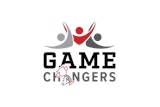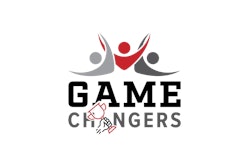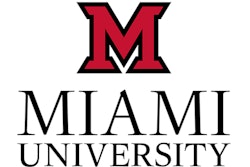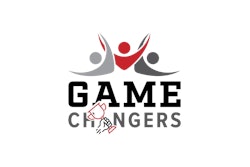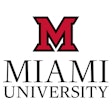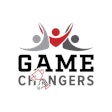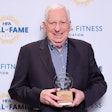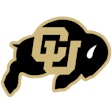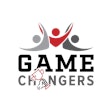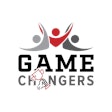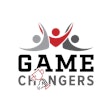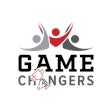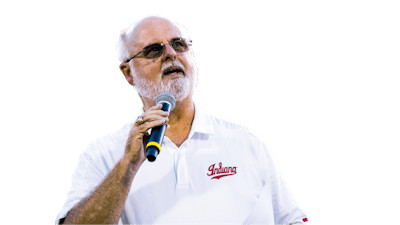
He pronounced “sophomore” as a three-syllable word and added a few extra Os to “Hoosiers” when Indiana University basketball players took the home court, but it’s Chuck Crabb’s longevity behind the public address microphone at Assembly Hall that stands out in the wake of his midseason retirement. For the better part of 45 years, Crabb’s baritone voice and trademark cadences were unmistakable aspects of game day in Bloomington. As March Madness approached, AB senior editor Paul Steinbach checked in with Crabb, 71, and learned there was much more to his decades-long career than met the ear.
You were a 1973 journalism graduate of IU, and had worked your way through school.
I worked all four years at the Bloomington Herald Telephone, now called the Herald Times, and also worked for three years in the sports information office — or as we called it then, athletic publicity. The buzzwords get used now. I believe they speak more of strategic communications.
Under what circumstances did you realize you could put your voice to good use?
I had done some announcing at my high school before coming to Bloomington, and I believe it would have been my junior season — the junior football season, ’71 — the gentleman who normally did the internal PA for the press box had suffered a stroke that summer and was very challenged with his recovery and coming back. So, I started doing the internal PA at Memorial Stadium in 1971 and did that through the 1976 season. It was, I guess, an audition for Tom Miller, then the SID for Indiana, who was part of a selection process in 1976 when the long-time stadium announcer and arena announcer, Burt Laws, was retiring at the end of the 1977 basketball season after 40 years as stadium announcer for the two major sports. Ironically, between that invitation and when I actually first announced for IU, I was hired full time by athletics as the first-ever assistant athletic fundraiser in what we call the Varsity Club.
You gave up the fundraising?
At the end of that basketball season, the athletic director at the time, Paul Dietzel, was recipient of numerous cassettes and audition tapes from radio-TV majors, from voice majors, suggesting that this would be a great opportunity for their career to be furthered by being the public address announcer for football and men’s basketball while they were in Bloomington. What was in my favor was the fact that Mr. Laws had done the announcing for IU for 40 years, so consistency and continuity were very important criteria when they were looking for the person who was going to step into his seat.
Did you tell them that you weren’t going anywhere?
Tom certainly was my champion of that cause. Mr. Dietzel said, “Well, let’s give this a shot and see how it works out.” And it lasted 45 years. I think that’s pretty good indication that I satisfied their standards for what they wanted. But when you think of it, two voices basically had been the public address announcers for Assembly Hall and men’s basketball for 85 continuous years.
Why did you give up football after 26 years?
I’ve had three positions with athletics — three years as athletic fundraising, almost 12 years as the first-ever sports promotion director, and then in 1990 I became an associate athletic director for events and facilities. So, my day job, if you will, was facility management and operations. In 2003, we opened major renovations to Memorial Stadium with our press box, adding suites and club seats. And with the opening of the new football amenities for donors and ticket buyers, Terry Clapacs, who was the athletic director at the time, called me in and said, “You seem to be our answer man. If anybody has a problem or an issue, just call Chuck, just see Chuck. So would you mind stepping aside with football and taking over game-day responsibilities?” And I’m like, “I work at your beck and call, sir. If that’s what you want me doing, that’s what I’ll be doing.”
If I’m hearing you right, the only job you’ve ever held professionally outside the auspices of IU was that newspaper job.
Well, for three years after graduating from IU in ’73, I worked one year as a wire editor for the Tribune in Terre Haute, Ind., and then two years as managing editor of my hometown paper before coming back to IU. But I was within one hour of Bloomington, so I could come back and volunteer and work for Tom and other people in the sports information office, and get a free ticket to watch Quinn Buckner, Scott May, Kent Benson and that group [members of Indiana’s undefeated 1975-76 national championship team] as they went through. I was unbelievably fortunate to have that volunteer opportunity.
What else, if anything, did you do for IU?
I was involved with our game-day experience, before we started extending that to all sports. I mean, it was pretty much football and men’s basketball. I was somebody who drove cheerleaders to road football games and certain men’s basketball games. And, so, the kids went to the athletic director and said, “We want Chuck to be the administrator for our program. We almost would see him as our coach.” Now, I have absolutely no gymnastic skills or ability to lead a cheer at all, but I think with 45, almost 46 years with the department, I always was available to apply the skills and talents with which I’d been blessed to meet the needs of the athletic program. I’m extremely proud of the six national championships our all-female squad has won, and probably more proud of the fact I influenced over a thousand students during the 43 years that I worked with them on an administrative level.
Sounds gratifying.
You know, athletics for me has been a people-person opportunity — reaching out, greeting and meeting, touching their lives, helping them with issues they have during their undergraduate careers. And then later seeing them when they come back with their children to say that “This is Mr. Crabb, and he did this for me, and he helped me to become what I am today.” That’s very gratifying.
It’s hard to imagine a better “dream job” scenario.
Very fortunate. You know, the events, games and matches — things that I’ve worked in my full-time role as associate AD for facilities — certainly are cherished, but more so the people with whom I’ve worked and the kids I’ve advised, the alumni and fans. My seat at the scorer’s bench and at the 10-second line of Assembly Hall was almost like a greeting point, where I could be sitting there reading material, getting ready to maybe open the key and announce, and there’d be somebody leaning down on my shoulder starting to speak to me and talk about the game, or talk about what the traffic was like outside coming in, or a pat on the head or a peck on the cheek. But I tried to maintain focus, and the style of announcing that I utilized in those 45 years, really was more a reporting situation than somebody who was trying to elicit a response and encouraged the crowd to cheer and react.
Has there been a trend toward this kind of crowd-response approach to PA announcing that you just described?
I’m more of the Bob Shepherd Yankee Stadium school. I certainly have noticed a lot of other Big Ten schools — I mean, the style of announcing is dictated by what the university wants to have its presentation be. Mine was defined very early in my career, in 1977, when doing an IU-Notre Dame game, I got a little excitable with the young man’s name of Wayne Radford, and Radford you could draw out that Raaaadfoooord and really get excited if he scored a basket or did something. And Wayne hit some very important free throws, and we beat a highly ranked Notre Dame, a Digger Phelps-coached team, in overtime. The next morning when I came into work, the then-assistant athletic director called me into his office where Bob Knight had sent his lead assistant who had a very precise message from Coach Knight that if I didn’t change the style of announcing that I presented, I no longer would be the public address announcer. He in so many words said from Coach Knight that no individual in the presentation is any greater than the game being played on the court. So, I pretty much took that to heart.
What else about the profession has changed?
Well, a lot of things with public address announcing has changed over the years. It’s more programmed. There are multimedia rights that the university sells, which often includes public address announcements — commercials — during the game. The pregame through the end of the game is all programmed. I would have upwards of 18 pages of script with a men’s or women’s basketball game. There’s a timeout on the floor, and you’ve got things to read during that two minutes. That’s one major difference.
How has game day changed at Assembly Hall?
Well, we do use more recorded music now. We still have a very, very well-received 90-piece basketball pep band from our school of music. But they’re supplemented often by recorded tunes, simply because it’s just felt that there needs to be a little bit more enthusiasm and thump, if you will. We have a video recording that is shown before the Indiana starting lineup and the air vibrates with the amount of volume that’s in the house.
Has the technology changed? Has there been an upgrade in sound quality?
We’ve done all of that. I mean, gosh, since 2005 we’ve had the LED center-hung video, we’ve had the facia board on the south balcony, we’ve had LED ribbon boards across the front of the scorer’s bench, and at the ends of the court. Our sound system is high quality with subwoofers installed specifically to amplify and make music more of an experience than it had been in Assembly Hall.
I sometimes miss a simpler approach when a pep band didn’t need the help of a DJ, but I don’t think we’re ever going to put that genie back in the bottle, do you?
No, I don’t think so either. Besides the in-game music, we do play for 90 minutes pregame recorded music that the players have requested. Now, much like the Super Bowl halftime with Dr. Dre and Snoop Dogg, we have make sure the versions of the rap and hip-hop music that the players request is clean to avoid being embarrassed by language. But volume is an issue during the pregame. I mean, people often will stay out in the concourses until the last 10 minutes before coming into their seats.
Let’s talk about the game and how it’s changed. You started at IU before the NCAA adopted the shot clock and three-point line. Do you think the college game is better today than when you started?
The game, obviously, moves up and down. There’s a lot of movement, and offensively things have changed a lot in that regard. Not everybody’s a three-point shooter, and I wish they didn’t try and show that they were or weren’t a three-point shooter.
There can be some awfully dull games if a team is 2 for 20 from the three-point line.
Exactly.
There must be a fair amount of homework to PA announcing. What was the hardest name you ever had to pronounce?
Kofi Cockburn [pronounced Coburn], when he first came up here with Illinois a couple years ago. But in the 45 years that I did Assembly Hall announcing — I mean, our early years — the Soviet national team often would play at Assembly Hall. And one of the pieces of advice that Mr. Laws gave me when he retired and we were talking transition, he told me that in our college of arts and sciences, that we had one of the largest concentrations of foreign language instruction in the United States. There’s something like 120 or 150 different languages and dialects that are taught on our campus. Russian just happens to be one of those. And he said that whenever you have a visiting team that wants to play coach Knight and Indiana basketball, just call in to this particular classroom building where all the foreign language programs were located. So, I would. I would sit down with one of the instructors, be it a graduate student or a young professor or assistant professor, and I would learn the phonetics of that language and what the different symbols over the letters and the combinations of O and A and E and I, and how to not embarrass myself when introducing those players. I always would make it a point to try and master some of the skills, so I would not be an embarrassment to the university. That also led to some great opportunities — in ’94, going to Chicago and doing the six World Cup men’s soccer matches, and in ’99 doing three or four women’s World Cup matches at Soldier Field. People respected me for the homework that I put in to try and make a good presentation. It was, for the most part, always well received, because you’re hearing in this conversation the one language I do have, and that’s it.
When you were in your second year at IU, did you refer to yourself as a soph-o-more?
That became another trademark, along with “Your Indiana Hoooosiers.”
So, you came up with that for the mic?
Pretty much. I was a good friend of Ron Althoff, who was a longtime Ohio State announcer, and I heard him say that when I sat in his booth one year at the Horseshoe. And so, I just started doing it, and people didn’t necessarily realize that there was another announcer doing it. It’s interesting. The associate athletic director who is finishing the season with men’s and women’s basketball, he very kindly has continued saying soph-o-more.
Do you think the next guy has 40-plus years in him?
Well, it’ll be interesting to see. That’s someone else’s decision and I wish that person well. I mean, they’re going to play before a house that is very understanding of basketball and very particular. And our people understand that Assembly Hall doesn’t need maybe the encouragement that other universities and other game-day settings have determined are appropriate for them. I think whomever takes that seat, beginning in November of 2022, will have a wonderful experience. And he or she — I mean, there are women certainly that are utilized in a lot of different sporting events now, professional and definitely internationally — I hope they have as much enjoyment with it and are as received as warmly as I was in those 45 years.
Why did you choose to retire midseason?
Christmas time, I went to Florida and enjoyed Christmas with my wife. She had moved to Florida a year ago in anticipation that at some point I would be retiring. And it was very wonderful. I mean, 85 degrees and your feet in the gulf is pretty special on Christmas Day. But, on Jan. 20, a very dear friend, my sound technician at Assembly Hall, passed away from a massive coronary. The next week at his funeral, I was asked to participate by his family. And then, in staying for the visitation, I heard so many people come up to this gentleman’s widow and say, “It’s just a shame that John didn’t retire and have a chance to be with you, to be with your two grown daughters, to help teach his two grandsons how to play golf, how to throw a baseball, how to do various things that granddads do with their grandsons.” And that certainly got me thinking. I asked for a meeting with the athletic director and my immediate superior, the deputy athletics director, and we worked out my stepping away with four men’s games and maybe five women’s games remaining. I don’t know that there’s ever a good time, but people always said, “You will know when it’s your time, and you’ll want to step aside.” So I did.
Do you miss the pregame electricity?
Oh. Yeah. I mean, there were unbelievable emotions that would go through me when I used to sit there. Always a little bit of nervousness, excitement for what the next 40 minutes — the two 20-minute halves — were going to hold for my alma mater. I’m just as much an Indiana basketball fan as the next person, but had to learn very early discipline to control my emotions. Don’t let them overwhelm and try and get in the flow of the game. Coach Knight was a pretty good teacher in that regard. He got my attention. I always wanted to be a complement to what was happening with Indiana basketball. I never put myself in importance greater than the game. The five championship banners at the one end of McCracken Court and the eight banners that hang high at the other end, saluting different basketball accomplishments, show a great pride in what we’ve had since the year 1900 in Indiana basketball. I was just very fortunate to be a part of that and to meet a tremendous number of people and help them see the game, as I would simply report what was happening and allow them that moment to get excited.














